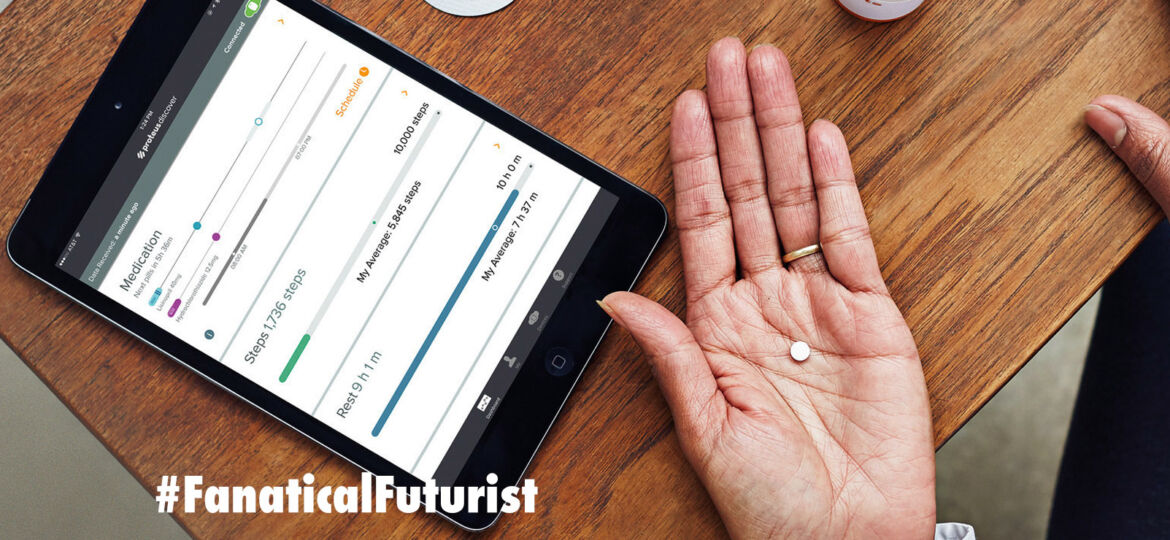
WHY THIS MATTERS IN BRIEF
Not everyone takes their medication but now companies and doctors can tell precisely when and if a patient has taken their prescribed meds, but it opens up a whole set of questions about ethics, privacy and security.
The US Food and Drug Administration (FDA) this week, after two years of deliberation, announced its first ever approval of a pill with an embedded sensor that digitally tracks if patients have ingested it, ushering the US into a new era of smart pharmaceuticals, and, some say, medical surveillance.
The treatment, called Abilify MyCite, is essentially a clever delivery system for the antipsychotic drug Aripiprazole that’s used to treat schizophrenia and bipolar disorders, and now, for the first time, doctors prescribing the drug will know first hand if their patients are actually taking it.
“Being able to track ingestion of medications prescribed for mental illness may be useful for some patients,” says the FDA’s director of psychiatric drugs evaluation, Mitchell Mathis.
“The FDA supports the development and use of new technology in prescription drugs and is committed to working with companies to understand how technology might benefit patients and prescribers.”
Abilify MyCite’s tracking system is centred around a tiny ingestible sensor about the size of a grain of sand, called an Ingestible Event Marker (IEM), made from safe levels of copper, magnesium and silicon.
Once the pill and the IEM inside it are swallowed, stomach acid activates the sensor, sending an electrical signal to a wearable patch worn on the patient’s chest. The patch records the date and time the pill was ingested, and relays this information to a smartphone app.
Users of the app – including the patient, but also any authorised doctors or family members – can then check in on the patient’s ingestion data, keeping direct tabs on the timely swallowing of oral medication in private like never before.
In other words, that old hide-the-pill-under-your-tongue trick won’t work any longer.
The smart pill’s manufacturers Otsuka, who make Abilify, and Proteus, who are the IEM developer bill their innovation as “the first digital medicine system”, and they say it will make it easier for caregivers to objectively monitor patients’ adherence to medication regimens.
While there’s no research as yet to indicate the ingestion tracking system actually improves patients’ compliance in taking their meds, the companies are hopeful that it might do just that, which, in the case of schizophrenia, could potentially help mitigate the symptoms of the 1.1 percent of Americans with the illness.
But some experts are concerned about the psychological ramifications of a drug that essentially acts as a tattletale if you don’t take it the right way, especially considering the target market for aripiprazole.
“Many [schizophrenia] patients don’t take meds because they don’t like side effects, or don’t think they have an illness, or because they become paranoid about the doctor or the doctor’s intentions,” said psychiatrist Paul Appelbaum from Columbia University, then adding, “a system that will monitor their behaviour and send signals out of their body and notify their doctor? You would think that, whether in psychiatry or general medicine, drugs for almost any other condition would be a better place to start than a drug for schizophrenia.”
Those concerns were shared by fellow Columbia University psychiatrist Jeffrey Lieberman, who likened Abilify MyCite to “a biomedical Big Brother”, noting the “irony in it being given to people with mental disorders than can include delusions”.
Yet, the ultimate impact of an embedded drug monitoring system like this goes well beyond the treatment of just schizophrenia and mental illness.
Non-adherence to recommended medication taking patterns in the US has been estimated to cost more than $105 billion a year, so there are important economic factors behind the FDA’s approval. But while Abilify MyCite may be the first of these kinds of drugs, it almost definitely won’t be the last, with reports the FDA is anticipating a coming wave of such self-monitoring medications, and if this is the case, which it probably is then you can expect it to bring up a whole host of new questions and concerns about ethics, privacy, personal rights, and whether this kind of ingestion tracking can truly be safeguarded in the interests of the patient. Or hacked in some way, let’s not forget that…
“We’ve seen time and time again that stuff that’s being transmitted ends up in the hands of people it shouldn’t,” said pharmaceutical policy researcher Walid Gellad from the University of Pittsburgh, “and there are real concerns about data security.”
Abilify MyCite is expected to hit the market sometime next year, and for better or worse, the seeds of snitch medication will have been planted.
















